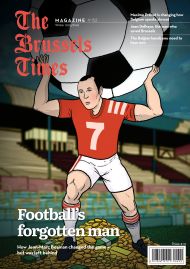Belgium is well-known for being home to some of the best contemporary artists around, such as Stromae and Angèle. But few are aware of how frequently the nation's musicians have topped the charts around the world and become global hits.
From pop and electronic to iconic remixes, The Brussels Times has compiled a list of some of the best Belgian bops of all time – which are often mistaken as coming from elsewhere.
Daydream - Wallace Collection (1969)
'Daydream' was recorded by the largely forgotten Belgian pop rock band Wallace Collection, named after the London museum. In 1969, six Belgian musicians were working in London at the legendary Abbey Road Studios, made famous by the Beatles. There, they recorded and produced their hit single 'Daydream'.
With strings and flutes, its melody is borrowed from the finale of Tchaikovsky's 'Swan Lake'. Lead singer and guitarist Sylvain Vanholme wanted to create a blend of classical and pop, and wrote 'Daydream' with band members Raymond Vincent and Jacques Namotte who were classical musicians (Namotte was also a violinist with the Belgian National Orchestra).
The song was a hit in mainland Europe, and has since been covered several times, most notably by the Günter Kallmann Choir in 1970.
Watch the music video here.
Ça plane pour moi - Plastic Bertrand (1978)
Credited to Brussels-born Roger François Jouret (Plastic Bertrand), but sung and written by Lou Deprijck and Yvan Lacomblez – whose trademark style was "strange images put together" – this international hit was conceived as a comic tribute to the punk movement.
The whacky and colourful song, featuring nonsensical French (and occasionally English) lyrics, has been covered by many artists. The original 1978 recording was the most successful, however, reaching number eight on the UK Singles Chart that same year.
Watch the music video here.
Pump up the jam - Technotronic (1989)
A fusion of hip hop and deep house, 'Pump Up the jam' quickly became a worldwide hit following its release, reaching number two in the UK in late 1989 and climbing onto the US Billboard Hot 100 in early 1990.
Although 'Pump Up the jam' is sung and written by Congolese-Belgian hip hop artist Ya Kid K, it was actually model Felly Kilingi who was pictured on the album cover and lip synching, dancing and wearing different costumes in the accompanying iconic music video, allegedly for marketing purposes.
Watch the music video here.
I Follow Rivers - Lykke Li [The Magician Remix] (2011)
Swedish singer-songwriter Lykke Li first released 'I Follow Rivers' in January 2011, a blend of indie pop, dream pop and electronic. In the autumn of that same year, the track shot up into number one in several European countries thanks to the remix from Belgian DJ and producer Stephen Fasano (The Magician). Between its release and May 2014, the remix sold 1.2 million copies.
Fasano, who hails from Namur, is also known for his 2014 single 'Sunlight' and remix of Clean Bandit's 'Rather Be' in 2014. Since 2010, he has been releasing monthly mixtapes called Magic Tapes, which showcase a variety of new house and dance.
Watch the music video here.
Somebody that I used to know - Gotye (2011)
When 'Somebody that I used to know' dropped in 2011, it became one of the biggest hits around the world. But few knew that its creator was actually born in fairytale Bruges. Gotye – whose real name is Wouter 'Wally' De Backer – moved to Australia at a young age. His mother nicknamed him 'Gotye', based on Gauthier (the French equivalent of his Dutch name).
The slow-building duet tells the story of a tumultuous break-up and features Kimbra from New Zealand. It climbed to number one in 18 countries and won Best Pop Duo/Group Performance and Record of the Year at the 55th Annual Grammy Awards.
Watch the music video here.
Where are you now - Lost Frequencies (2021)
Touring Belgian DJ Félix De Laet, known as Lost Frequencies, rose to fame with the acclaimed single 'Are You With Me' in 2014 – at just 21 years of age. Astonishingly, the track resulted in him becoming the first Belgian artist to hit number one in the UK.
His 2021 smash hit 'Where Are You Now' has also received over 1.5 billion combined streams to date, making Lost Frequencies the first Belgian solo artist to appear in Spotify's international Top 50.
De Laet has soared to success in the international music industry over the past half-decade and has played at various festivals, including Tomorrowland in 2022. He was the most-booked festival artist of any genre pre-pandemic.
Watch the music video here.

